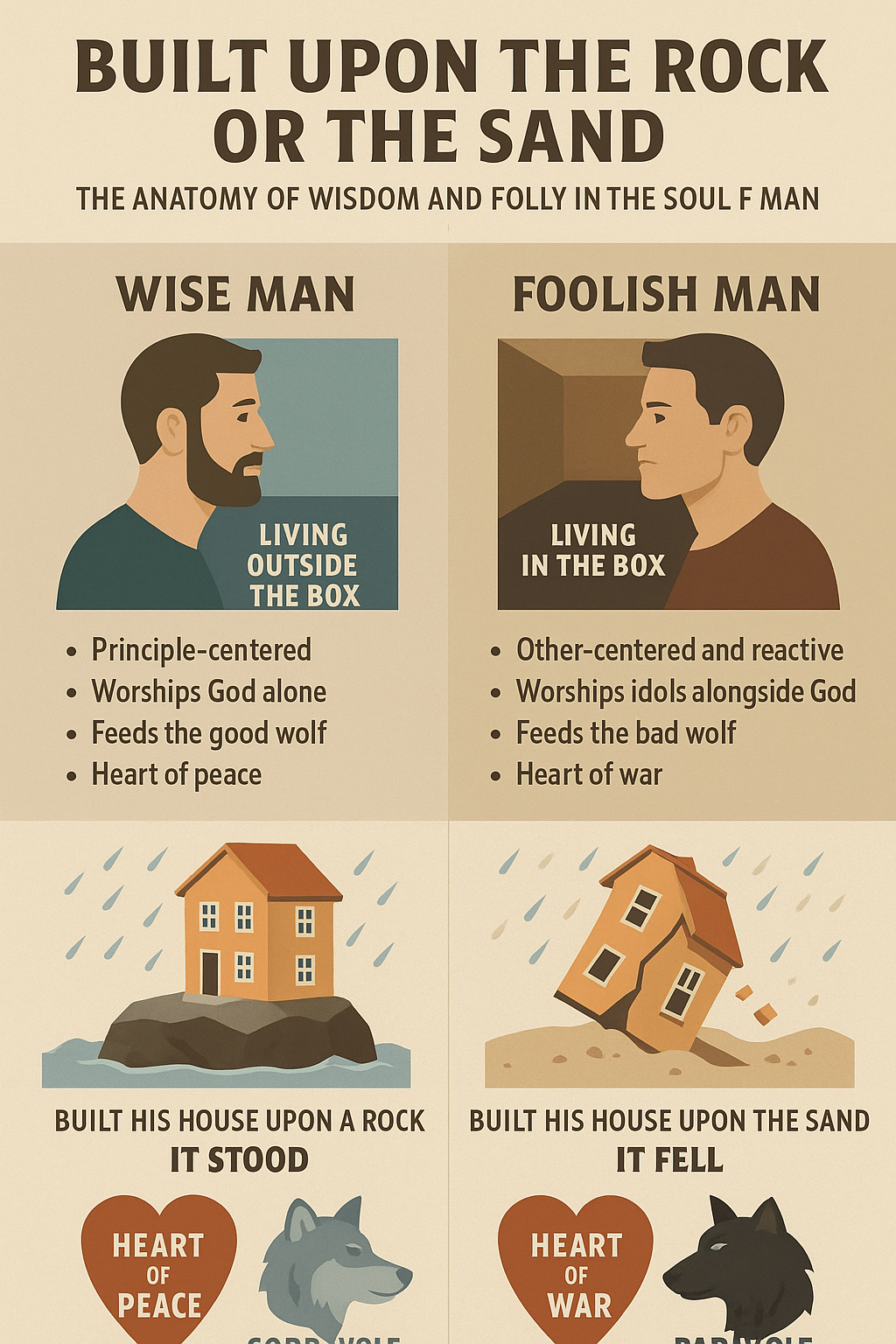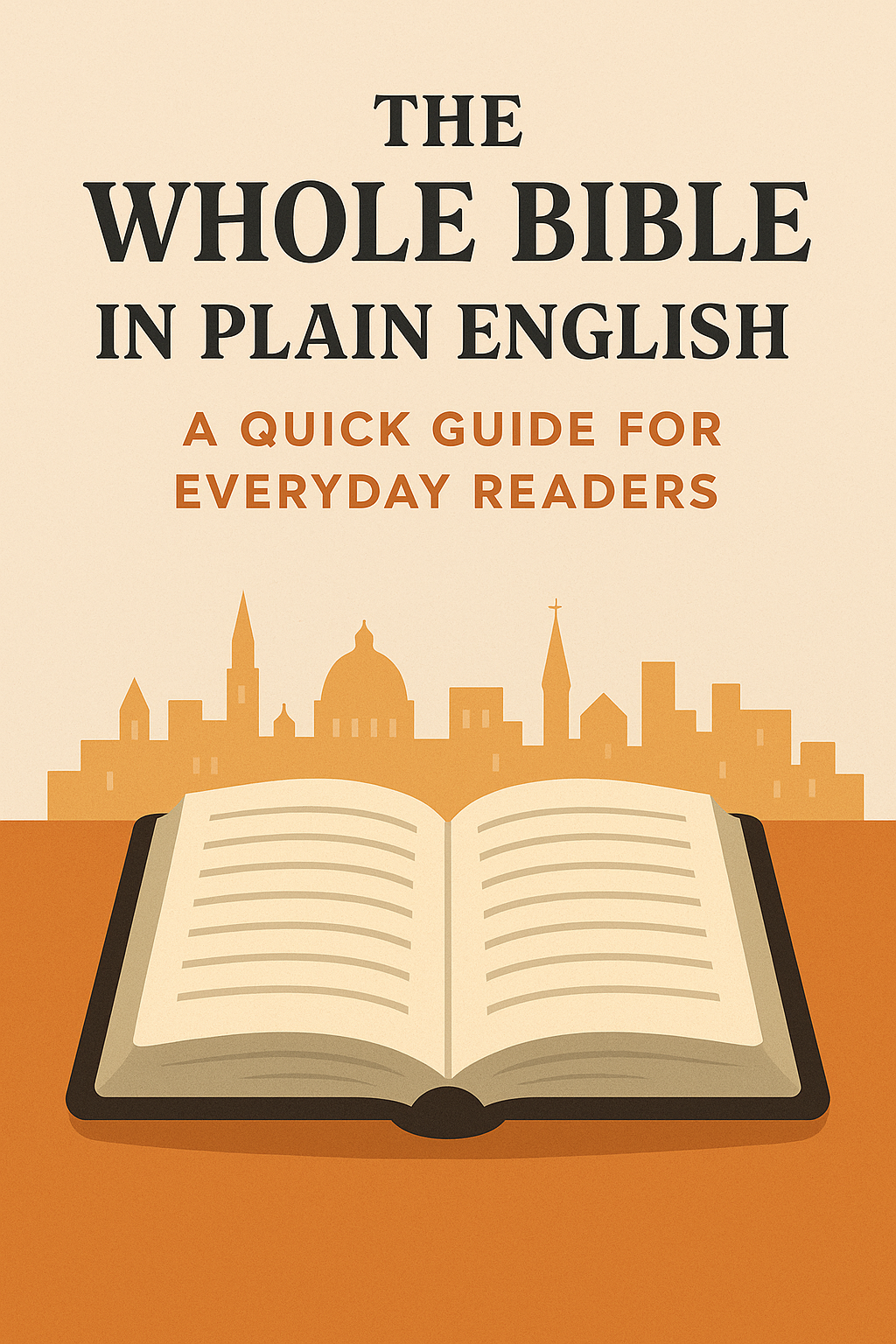“Therefore whosoever heareth these sayings of mine, and doeth them, I will liken him unto a wise man, which built his house upon a rock…”
— Matthew 7:24–27 (KJV)
I. The Parable of the Two Foundations: A Timeless Test
Christ’s parable of the wise and foolish builders is not a commentary on architecture, but on alignment.
It is about what we base our lives on—our choices, our values, our center—and how those unseen foundations determine whether we stand or collapse when life’s inevitable storms descend.
- The wise man builds on rock: steady, grounded, immovable.
- The foolish man builds on sand: shifting, unstable, hollow.
In this distinction lies a universal truth: our response to adversity reveals the foundation we’ve built upon—be it eternal principles or fragile ego.
But what truly distinguishes the wise from the foolish? Not just hearing truth, but living it. And not simply believing in God, but worshipping Him in spirit and truth, without idols—seen or unseen.
II. The Wise Man: Living in Truth, Built Upon the Rock
1. He Lives Outside the Box (The Arbinger Institute)
The wise man sees others as people, not objects.
He is not trapped “in the box” of self-deception, justification, or blame. He:
- Acts with empathy.
- Accepts responsibility.
- Views others as sacred agents with needs, fears, and hopes.
Being outside the box means being awake. Present. Relationally clean. He has a heart of peace, not war.
The house built on the rock stands firm because it is built on truthful perception of self and others.
2. He Is Principle-Centered (Covey’s 7 Habits)
The wise man lives by timeless principles:
- Integrity
- Responsibility
- Patience
- Justice
- Compassion
He does not react impulsively to the storm. He responds with self-awareness and proactivity—the core of Habit 1.
His priorities are aligned with what matters eternally (Habit 2), and he lives with daily discipline (Habit 3).
His relationships are rooted in trust and mutual respect. He seeks first to understand, then to be understood (Habit 5). He is not driven by popularity, pleasure, or pride—but by principles.
3. He Worships God Alone (Gileadi)
According to Avraham Gileadi’s insights, many profess loyalty to God while also placing their faith in idols—security, wealth, culture, comfort. But the wise man does not divide his heart.
He doesn’t serve two masters. He resists the modern idolatry of:
- Celebrity Christianity
- Political salvation
- Material abundance as proof of spiritual favor
His allegiance is undivided, his motives pure. He is a covenantal man, not a cultural one.
He remembers that obedience to God’s word—not just belief in it—is what roots the house to the rock.
4. He Feeds the Good Wolf
The Native American parable tells of two wolves inside us:
- One is evil—resentful, envious, arrogant, greedy.
- The other is good—kind, faithful, peaceful, generous.
Which one wins? The one we feed.
The wise man feeds the good wolf. Not perfectly, but consistently. He guards his thoughts, his emotions, his habits. His spiritual diet builds inner resilience. He prepares for storms by living in truth before they come.
III. The Foolish Man: A Foundation of Sand
1. He Lives In the Box
He sees others as problems. He justifies, blames, manipulates. He:
- Judges others to feel right.
- Avoids responsibility.
- Lives with a heart at war.
This distortion of reality blinds him. He becomes emotionally reactive, locked in cycles of pride and offense. When the rain comes, he cannot adapt. He collapses inward, because inwardly, he’s already in conflict.
2. He Is Other-Centered, Reactive, and Immature
Instead of being guided by internal principles, he is guided by:
- Public opinion
- Comparison
- Impulse
He is not principle-centered, but circumstance-centered. When life pleases him, he performs. When it disappoints him, he crumbles.
His habits mirror his foundation:
- He procrastinates.
- He blames others for his condition.
- He chases surface solutions to spiritual problems.
This is the man who hears the words of Christ but does not do them. His foundation is religious performance—not spiritual integrity.
3. He Worships Idols Alongside God
Like ancient Israel, the foolish man still claims allegiance to Yahweh but bows daily to Baal.
He seeks:
- Validation from the world.
- Wealth as a sign of God’s favor.
- Control over others rather than mastery over himself.
He loves one master and despises the other—but often without realizing it.
He prays while plotting.
He quotes scripture while harboring bitterness.
He praises God publicly while feeding pride privately.
This double-mindedness fractures his soul. His spiritual house looks firm—until the wind reveals its foundation.
4. He Feeds the Bad Wolf
The foolish man feeds resentment, offense, gossip, ego. His thought life is undisciplined. His cravings rule him. He reacts to every trigger.
He cannot withstand the storm because the storm is already inside him.
IV. The Heart of Peace vs. the Heart of War
At the core of this contrast is the condition of the heart:
- The wise man has a heart of peace—anchored in truth, humility, and divine perspective.
- The foolish man has a heart of war—reactive, proud, self-justifying.
The storm doesn’t create these conditions—it reveals them.
“Out of the abundance of the heart the mouth speaketh.” — Matthew 12:34
The wise builder is not spared the rain, flood, or wind. He simply remains standing. Because peace is not the absence of storms—it is the presence of integrity.
V. When the Storm Comes: Revealing the Hidden Foundation
Both the wise and foolish man hear the teachings. Both build. Both endure storms.
But only one stands.
The difference is not knowledge—but alignment and obedience.
The house on the rock doesn’t fall because the man lives in:
- Humility
- Discipline
- Unity with eternal truth
The house on the sand collapses because the man built on:
- Ego
- Image
- Convenience
The fall is great not because the house was ugly, but because it was beautiful and deceptive.
VI. The Final Question: What Are You Building On?
Every day, brick by brick, we are building a life:
- With every thought we feed.
- With every habit we form.
- With every god we worship.
And when the rain comes—and it will—our foundation will be revealed.
Are you:
- In the box or out?
- Principle-centered or reactive?
- Idol-worshiping or covenant-keeping?
- Feeding the good wolf or the bad one?
- Harboring a heart of peace or a heart at war?
These are not small questions.
They are the difference between collapse and endurance.
Between a life that burns in the storm and one that shines through it.
VII. Conclusion: Obedience is the Rock
In the end, Christ makes it clear:
The difference is obedience.
“Whosoever heareth these sayings of mine, and doeth them…”
Not understands them. Not quotes them. Not feels convicted by them—but does them.
Because only doing truth builds strength.
And only when our foundation is the Rock—not our emotions, not our idols, not our comfort—can we stand, unshaken, and become what Christ called us to be:
Wise men.
With houses that do not fall.
Because they are built upon the Word,
Lived.





